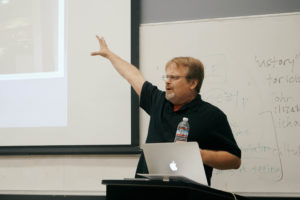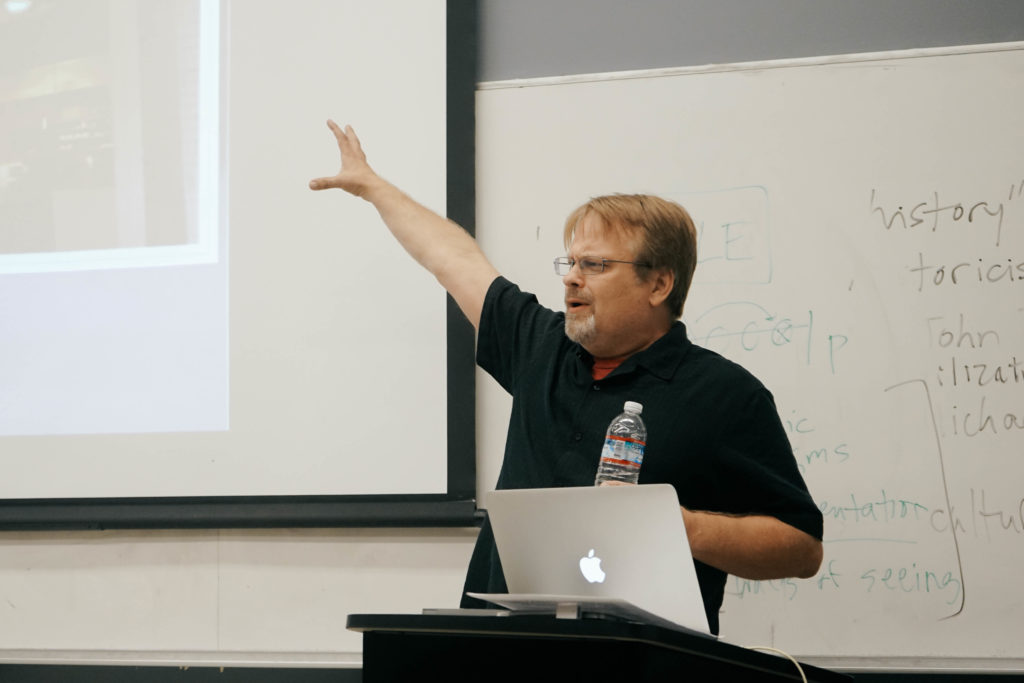Chef Dave Anderson on alternative meats: sustainable solution and big opportunity for entrepreneurs
During the Sutardja Center’s Alt.meat Challenge Lab course, Chef Dave Anderson walked students through his career path in the meat analog industry, imparting his view on why this emerging field is important more now than ever before.
Prior to his success as a vegan chef, Anderson’s passions lied far outside of the food industry. Determined to be the next Jimmy Page, Anderson spent his college years pursuing his love for music as a student at the Berklee College of Music instead of studying recipes and concocting meat alternatives. But his brother, who became a vegetarian after reading Diet for a Small Planet, managed to convert Anderson to his meatless ways, spurring Anderson’s initial interest in finding alternative meat options.
Anderson then found himself in an unusual predicament: Despite dreams of making a career out of playing the guitar, Anderson was instead supplementing his income by working in restaurants cooking meat, all the while, he was a vegetarian surrounded by subpar meat alternatives.
Eventually, this contradiction grew to be too much, and he made the decision to refocus the dedication and passion he brought to music to finding more high-quality food options for vegetarians like himself. He went on to pursue classical chef training at Johnson & Wales University, going on to apply his education in new and innovative ways to create original vegetarian cuisine.
Over the next two decades, Anderson would to open his own high-end vegan restaurant, Madeleine Bistro, as well as develop well-received meat alternatives with the likes of Hampton Creek, New Crop Capital, Beyond Meat, and Outstanding Foods.
Anderson explained to the class of Berkeley students that while he was personally invested in finding meat alternatives because of his love for animals and the environment, the industry has more than just a moral appeal. The world’s food supply, Anderson said, is coming face to face with critical issues, such as overpopulation, less and less land for food production, dwindling water supplies, and the environmental consequences of food production.
It is not a question of if these resources are going to cause serious harm to the global economy and our environment, Anderson said, it is just a question of when. And the people with the solutions to these crises will be in a powerful financial position according to Anderson.
“It’s a big problem…what we’ve got here at this point,” Anderson said. “But, obviously — and you guys are here as entrepreneurs — it’s a huge opportunity too.”
During the Sutardja Center’s Alt.meat Challenge Lab course, Chef Dave Anderson walked students through his career path in the meat analog industry, imparting his view on why this emerging field is important more now than ever before.
Prior to his success as a vegan chef, Anderson’s passions lied far outside of the food industry. Determined to be the next Jimmy Page, Anderson spent his college years pursuing his love for music as a student at the Berklee College of Music instead of studying recipes and concocting meat alternatives. But his brother, who became a vegetarian after reading Diet for a Small Planet, managed to convert Anderson to his meatless ways, spurring Anderson’s initial interest in finding alternative meat options.
Anderson then found himself in an unusual predicament: Despite dreams of making a career out of playing the guitar, Anderson was instead supplementing his income by working in restaurants cooking meat, all the while, he was a vegetarian surrounded by subpar meat alternatives.
Eventually, this contradiction grew to be too much, and he made the decision to refocus the dedication and passion he brought to music to finding more high-quality food options for vegetarians like himself. He went on to pursue classical chef training at Johnson & Wales University, going on to apply his education in new and innovative ways to create original vegetarian cuisine.
Over the next two decades, Anderson would to open his own high-end vegan restaurant, Madeleine Bistro, as well as develop well-received meat alternatives with the likes of Hampton Creek, New Crop Capital, Beyond Meat, and Outstanding Foods.
Anderson explained to the class of Berkeley students that while he was personally invested in finding meat alternatives because of his love for animals and the environment, the industry has more than just a moral appeal. The world’s food supply, Anderson said, is coming face to face with critical issues, such as overpopulation, less and less land for food production, dwindling water supplies, and the environmental consequences of food production.
It is not a question of if these resources are going to cause serious harm to the global economy and our environment, Anderson said, it is just a question of when. And the people with the solutions to these crises will be in a powerful financial position according to Anderson.
“It’s a big problem…what we’ve got here at this point,” Anderson said. “But, obviously — and you guys are here as entrepreneurs — it’s a huge opportunity too.”


